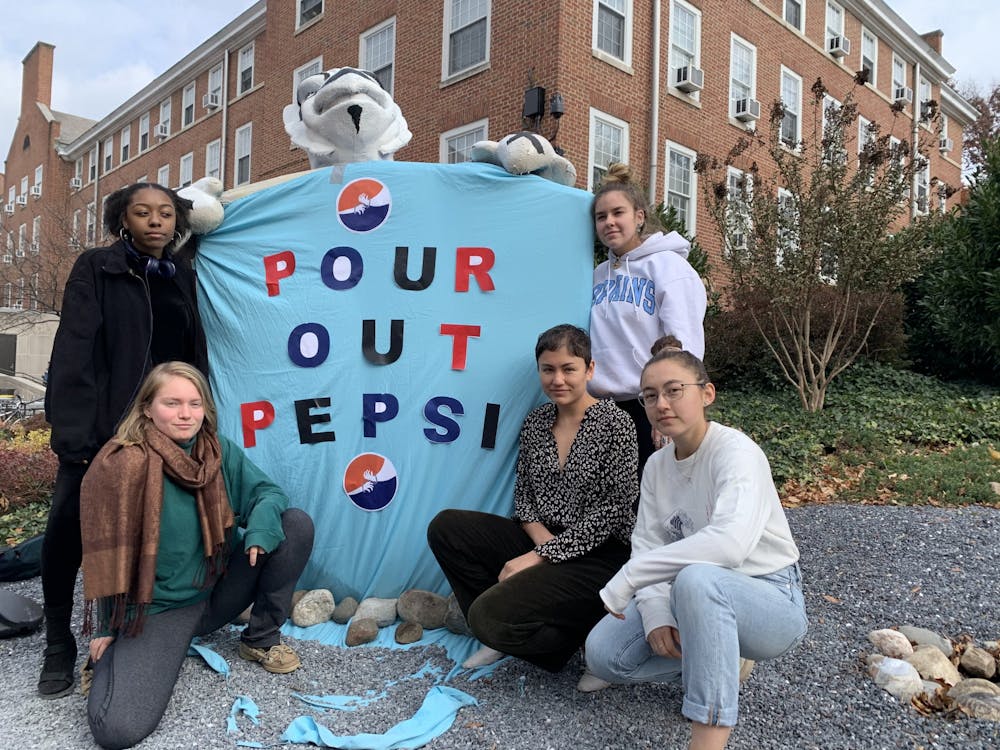Real Food Hopkins, a student organization promoting food justice and sustainability, held its Pour Out Pepsi rally outside the Fresh Food Cafe (FFC) on Wednesday.
The Pour Out Pepsi campaign was launched in March to protest PepsiCo’s history of violations against labor, sustainability and human rights laws. Real Food aims to convince Hopkins Dining to end its exclusivity contract with PepsiCo, which requires that 80 percent of all beverages sold on campus — not just soft drinks — are manufactured by PepsiCo.
Members of the campaign detailed their current mission statement in an online petition.
“We call on the University to uphold its commitment to promoting environmental sustainability and human ethics by ending this contract with PepsiCo and refraining from seeking another that is similar in nature,” they wrote. “In doing so, JHU will demonstrate a rejection of the socially and ecologically unsustainable practices of profit-hungry corporations.”
At the end of the rally, Real Food members delivered a letter to the administration which detailed student responses to a Google Form they sent out.
In an interview with The News-Letter, Laís Santoro, a member of Compassion, Awareness, and Responsible Eating (CARE), cited PepsiCo’s status as a major polluter as one of the reasons why the Pour Out Pepsi Campaign began. CARE is a student group that advocates for plant-based living and animal rights.
“It’s an overall unsustainable corporation. It’s the second biggest polluter in the world,” she said.
A report from April 2017, revealed that PepsiCo imports palm oil from ecologically destructive plantations in Indonesia where underpaid children harvest oil.
PepsiCo has donated $2 million to the University over the past seven years. PepsiCo donated $1 million in 1996 to aid the construction of the Ralph S. O’Connor Recreation Center. This past March, Associate Athletic Director Ernie Larossa explained that Athletics’ partnership provides funding for intramurals, club sports and athletics.
The campaign previously delivered a letter to Dining last spring. According to Katie Smith, co-president of Real Food Hopkins, Dining reviewed the groups’ demands during a phone call this summer. Dining will try to shorten the contract from four years to three with two one-year extensions, as well as make talking points from the contracts accessible.
Pour Out Pepsi’s current petition has reached 243 signatures. Demands include reducing the percentage of PepsiCo products the University is required to purchase from 80 to 60 percent, increasing transparency on PepsiCo’s donations to the University and reducing plastic waste from the beverages that PepsiCo provides Athletics by using larger volume bottles.
In response to other demands that Real Food made, Magowan wrote, Dining is currently implementing a reusable water bottle program in which bottles will be sold at Levering Hall and Charles Street Market for a reduced price to encourage use.
Santoro explained that she hopes to see a gradual decrease of PepsiCo products on campus in the coming years in order to make room for more sustainable products.
“The ideal solution is to bring in more local vendors and decrease constantly over the years the presence of Pepsi on campus,” she said.
Bela Garces, a senior environmental studies major in Real Food Hopkins, explained in an interview with The News-Letter that she and other members of Real Food met with Dining earlier this month to discuss the implications of the PepsiCo contract, which was up for renewal in June.
During that meeting, the organization laid out their demands on limiting PepsiCo’s influence. It was at this meeting in which they discovered that the contract had not yet been renewed.
Last week, Senior Manager of Dining Programs Ian Magowan explained in an email to The News-Letter that Dining has not yet signed a new contract and is conducting an internal review of the terms and conditions set by PepsiCo. According to Magowan, the contract review process has given Dining the opportunity to push for more sustainable programming.
Real Food members, Garces said, will be meeting with Magowan in the coming weeks. Garces reflected on Real Food’s relationship with Dining.
“Generally, the dining office has been very willing to work with us through our demands and they’ve told us that they’re not completely tied down to Pepsi,” she said. “I do think it’s fair to say the benefits they receive from a contract like this makes it hard to cut it.”
Garces commented that she wanted the student body to understand that ending the Pepsi contracts would not eliminate the presence of Pepsi on campus.
Nor does Real Food Hopkins want to take away that choice. Instead, its priority is fighting against the monopolization that PepsiCo has over beverages in Hopkins dining halls.
“The ending of this contract does not mean that Pepsi will suddenly disappear from our school,” she said. “We can still buy from Pepsi without a contract. We just don’t think it’s right to have this exclusivity.”
Santoro emphasized the need for public awareness and action around environmental issues, especially as part of the university populace.
“We need to mobilize around these issues that we might not even know about and we need to constantly educate ourselves about what’s sustainable for Hopkins and for us,” she said.
Garces explained what she hoped the administration and Dining learned from the Pour Out Pepsi rally, emphasizing that this is not just an issue that pertains to Real Food, but to the entire student body.
“I hope that they got a sense of student’s wants for the contracts to be open. This isn’t just something the 10 of us in Real Foods Hopkins care about, it’s something that the Hopkins community cares about,” she said. “They should understand that students as a whole do not want this exclusivity contract or ties to a corporation like Pepsi on campus.”





